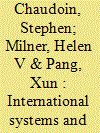| Srl | Item |
| 1 |
ID:
139797


|
|
|
|
|
| Summary/Abstract |
Following older debates in international relations literature concerning the relative importance of domestic versus systemic factors, newer debates emphasize interdependence among states and the complex interactions between systemic and domestic factors. As globalization and democratization advance, theories and empirical models of international politics have become more complicated. We present a systematic theoretical categorization of relationships between domestic and systemic variables. We use this categorization so that scholars can match their theory to the appropriate empirical model and assess the degree to which systemic factors affect their arguments. We also present two advances at the frontier of these empirical models. In one, we combine hierarchical models of moderating relationships with spatial models of interdependence among units within a system. In the other, we provide a model for analyzing spatial interdependence that varies over time. This enables us to examine how the level of interdependence among units has evolved. We illustrate our categorization and new models by revisiting the recent international political economy (IPE) debate over the relationship between trade policy and regime type in developing countries.
|
|
|
|
|
|
|
|
|
|
|
|
|
|
|
|
| 2 |
ID:
137818


|
|
|
|
|
| Summary/Abstract |
This paper extends systematic analyses of maritime piracy by verifying the robustness of empirical results and examining the forecasting ability of empirical models. Recent research by Ward, Greenhill and Bakke (2010) finds that statistically significant relationships frequently offer poor guidance when it comes to anticipating the inception of civil war. We assess the predictive ability of purported causal factors of piracy using evaluative statistical tools such as receiver-operating characteristic plots, out-of-sample predictions, and outlier analysis. Statistical results for in-sample and out-of-sample tests show that while factors such as military capacity, population size, coastline length, and trade volumes are statistically related to piracy, state fragility has by far the strongest predictive effect despite only being moderately statistically significant in the models. Outlier analysis demonstrates that while several countries experience higher numbers of piracy incidents than predicted, empirical models are generally robust to the presence of outliers. For policymakers, the findings suggest that counter-piracy efforts focused on capacity-building measures have the greatest potential for reducing the piracy threat.
|
|
|
|
|
|
|
|
|
|
|
|
|
|
|
|